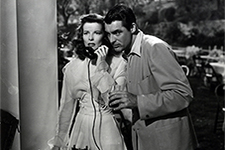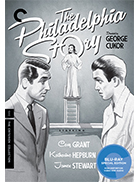The Philadelphia Story
|  The Philadelphia Story is one of the great romantic comedies of its era—an urbane, sophisticated farce about marriage, divorce, and remarriage. At the time, such material was typically set in Europe and was the province of Paramount Pictures, with its long list of European emigres in front of and behind the camera (it was the studio home of the inimitable Ernest Lubitsch). The Philadelphia Story, however, was produced at MGM, the most lavish and successful of the major Hollywood studios in the 1930s and ’40s, and as the title suggests, it is a distinctly American tale, set within a wealthy enclave in the iconic city where the U.S. Constitution was drafted and signed. The film transcends the essentially petty problems of its wealthy socialite characters, depicting fundamental conflicts of human relations and the lure of romantic attachment with an uncommonly humorous and knowing touch that flits gracefully between recognizable drama and outright fantasy. Most of the story unfolds in and around the palatial mansion of the Lord family, where the eldest daughter Tracy (Katharine Hepburn) is preparing for her wedding day. In the film’s wordless opening scene, which is not present in the Philip Barry play on which it is based, we see the disastrous last moments of Tracy’s previous marriage to ship designer C. K. Dexter Haven (Cary Grant), which involve her breaking his golf clubs and him pushing her down by her face. Because this was the fourth time Hepburn and Grant had played opposite each other, there was already a palpable screen chemistry between them, which would have made any dialogue or explanation superfluous. We get everything we need to know about their relationship in that one shocking moment, which reverberates throughout the rest of the film’s verbal sparring and relational shifts. Things get complicated with the arrival of Macaulay Connor (James Stewart) and Elizabeth Imbrie (Ruth Hussey), a respective journalist and photographer for a celebrity tabloid magazine who are posing as friends of the family to get the inside scoop on Tracy’s wedding to George Kittredge (John Howard), a self-made businessman who nonetheless lacks any sense of charm or humor (Cary Grant, he definitely is not). Their infiltration of the event is aided and abetted by Dexter, who also shows up much to the delight of Tracy’s adolescent sister Dinah (Virginia Weidler), who is still upset about their divorce. The ruse inadvertantly sets up a game-changing romance between Tracy and Macaulay, who fashions himself a serious writer who resents having been sent on such a fluff assignment. The screenplay by Donald Ogden Stewart is a bursting treasure chest of witty and sometimes subversive dialogue, and it is quite impressive that the studio managed to get a film that is so cynical about romance and marriage through the Production Code Administration (when MGM turned Barry’s play into the musical High Society in 1955, they did have to alter some of Cole Porter’s lyrics to satisfy PCA head Geoffrey Shurlock). The Philadelphia Story was Katherine Hepburn’s triumphant return to Hollywood after three years spent on Broadway, a move that is all the more astounding because she did it entirely on her own terms. After winning accolades for playing the role of the conflicted heiress in Barry’s play (a role he wrote specifically for Hepburn and in consultation with her), she bought the rights and then sold them to MGM with the stipulation that she play the lead and choose her co-stars and director. Hepburn had left Hollywood for the stage after a string of box-office duds in the mid-1930s had earned her the label “Box Office Poison” despite having won an Oscar for Morning Glory (1933), and her return to the silver screen was nothing if not a gamble, especially the way she commanded the terms (she even talked blustery MGM head Louis B. Mayer into allowing her to wear pants in one scene, which Mayer complained was a sign of female “permissiveness”). While Hepburn’s initial choices of Clark Gable and Spencer Tracy didn’t pan out, she managed to land James Stewart, who been named Variety’s “Cinematic Man of the Year” in 1939, and Cary Grant, with whom Hepburn had worked on Bringing Up Baby (1938) among other films and who was at the height of his stardom. And she also brought on director George Cukor, who had previously directed her in four films, including her first starring role in Bill of Divorcement (1932), as well as Little Women (1933) and Holiday (1938). Cukor was coming off a rough period of his own, having been replaced by David O. Selznick as director of Gone With the Wind (1939) due to his inability to see “eye to eye on anything” with the producer. The Philadelphia Story turned out to be a significant success for virtually all involved: Hepburn returned to her rightful status as a first-rate Hollywood star and shed the aura of being box office poison (she would go on to win three more Oscars and headline a long list of critical and commercial hits over the next four decades); Grant continued to polish his own urbane star persona to a glistening sheen; Stewart found some variation after MGM had struggled for years to find suitable projects for him, and he won his only Oscar, to boot; and Cukor delivered a top 10 box office hit and was nominated for a Best Director Oscar (the film was nominated for six Oscars, winning one for Stewart’s performance and one for Donald Ogden Stewart adapted screenplay). The film’s legacy is dominated by Hepburn’s magnificent return, of course, but it couldn’t have lasted had it not been such a fine specimen of the Hollywood studio machine firing on all cylinders, bringing together great talent that shines both independently and in unison. Even though the film is ultimately about, as Stewart’s character sardonically puts it, “the prettiest sight in this fine, pretty world … the privileged class enjoying its privileges,” it transcends any sense of pettiness and grasps gloriously and often uproariously the romantic and familial foibles that we all know.
Copyright © 2017 James Kendrick Thoughts? E-mail James Kendrick All images copyright © The Criterion Collection | |||||||||||||||||||||||||||||||
Overall Rating: 


 (4)
(4)


